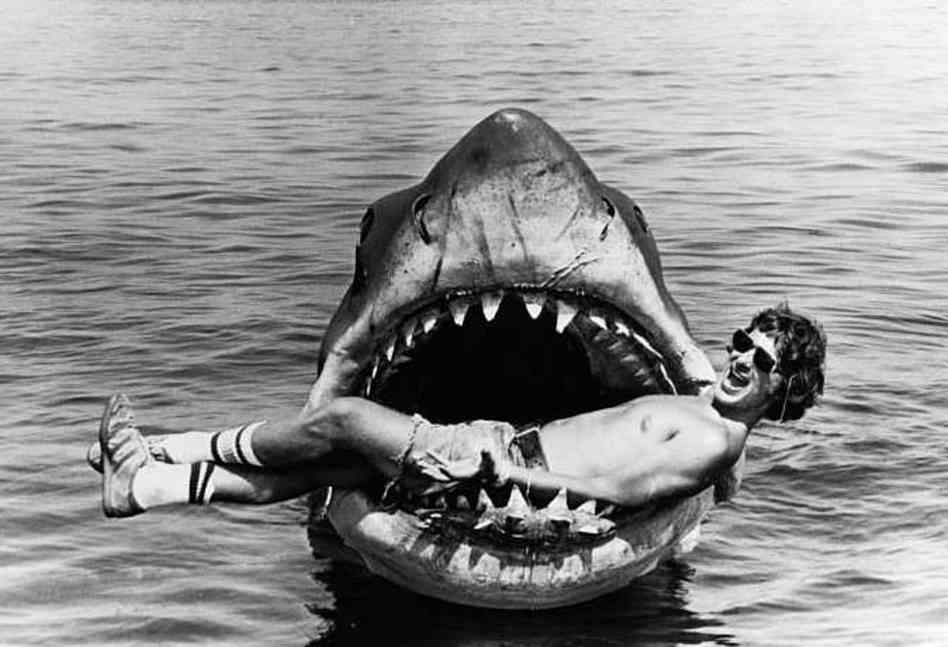By Liam Lacey
http://www.theglobeandmail.com/
June 25, 2012

Steven Spielberg
“It's all psychological,” says Mayor Vaughn in Jaws, “You yell ‘barracuda,’ everybody says, ‘Huh? What?’ – you yell ‘shark,’ we've got a panic on our hands on the Fourth of July.”
Panic on the Fourth of July has become commonplace at the movies since Jaws was first released in 1975. As the film hits Toronto screens in advance of its Blu-ray release in August, it’s right at home with box-office bait such as Prometheus and Spider-Man.
That’s because Jaws, the tale of a great white shark that terrorizes a small seaside town, remains the template for summer blockbusters. Over the years, of course, there have been a few changes. Instead of three white men (Roy Scheider, Richard Dreyfuss and Robert Shaw), our saviours might be African-Americans or women.
But thanks to Jaws, the summer movie now means non-stop action, spectacle and suspense mixed with snippets of grim comedy. And thanks to Jaws, Hollywood now makes more than half of its revenues from May to August with just the kind of movies that have a natural kinship with the summer theme park rides they inspire.
The film even evoked reactions suited to theme park rides. At a Dallas preview for Jaws, Steven Spielberg recalls, he saw a man rush out of the theatre after the scene where the shark kills a child. The nervous director assumed he was seeing the beginning of a mass exodus. Instead, the man vomited onto the lobby carpet, went to the washroom – and then returned to his seat.
“That’s when I knew we had a hit.”
Jaws was something more than just a hit, however, It represents a decisive turning point in Hollywood movie history, as big in its way as The Jazz Singer or Avatar.
To start, it brought a decisive end to a five-year box office recession, becoming the first movie to earn $100-million (U.S.). It was also the first movie to be widely advertised on television (up to 35 spots a night). And the film’s influence includes a steady stream of creature features – from Ridley Scott’s Alien (pitched as “Jaws in space”) to this year’s spoof Piranha 3DD.
More importantly, the movie ushered in the rise of the B-movie in Hollywood. When Peter Benchley, the author of the bestselling novel the movie is based on, sneered that Spielberg would be remembered only as a “unit director” of action sequences, he missed the point: Hit movies from then on would be primarily about action sequences.
For some film lovers, in fact, Jaws is seen as the beginning of the end of auteur-driven New Hollywood, with Spielberg serving, as author Peter Biskind has put it, as the “Trojan horse through which the studios began to reassert their power."
It wasn’t necessarily an easy ride for the studios, though. In another now familiar pattern, the story of Jaws’s tumultuous creation has become part of its marketing. Two books have been published about the making of the movie – one by an islander from Martha’s Vineyard (where the film was shot), another by the film’s scriptwriter. The upcoming Blu-ray will include four hours of material, including a new documentary, that gives fresh meaning to the cliché of snatching victory from the jaws of defeat. As Richard Dreyfuss said, “We began without a script, without a cast and without a shark.”
There were actually three mechanical sharks. But on the third day, one of them sank. The production was also shut down several times for shark repairs. A ten-week shooting schedule for a $3.5-million film soon turned into a five-and-a-half month shoot that ran closer to $10-million.
Spielberg later said he finally had to resort to something that was foreign to him: “subjugate absolute control to meaningful collaboration.”
Still, the first cut was reputedly a mess. Because the mechanical shark often looked phony, it became essential to cut around it, using implication rather than a physical object to create fear. John Williams’s two-note Jaws theme, echoing the sound of a heartbeat, became the primary terror device. (Williams won an Academy Award for best dramatic score, with Jaws also picking up prizes for best editing and best sound.)
Spielberg, of course, eventually went on to direct films both more weighty and more slight. With Jaws, though, he made his most purely successful entertainment – perhaps because he allowed himself to be subjugated to meaningful collaboration.
A classic, wrote Raymond Chandler, is a piece of writing that “exhausts the possibilities of its form and can never be surpassed.” When it comes to a movie that mixes popular folksiness and sudden jolts of terror, Jaws is no doubt a classic. And for good and bad, we’re still bobbing up and down in its giant wake.
Jaws begins a week-long run at Toronto’s TIFF Bell Lightbox on Friday (tiff.net). The film will be released in Blu-ray on Aug. 14.
No comments:
Post a Comment